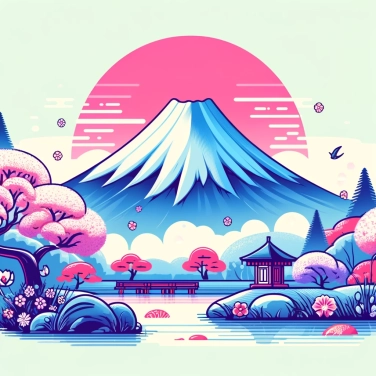Mount Fuji is considered a sacred symbol in Japan because of its imposing beauty and its importance in Japanese culture and spirituality. It is revered as the residence of kami (divine spirits) and has inspired many artists and poets throughout the centuries.

Mount Fuji has long been a sacred place in both Shinto and Japanese Buddhism. For followers of Shintoism, this mountain is considered the home of divine spirits, known as kami. Especially revered is the goddess Konohanasakuya-hime, associated with flowers, fertility, and protection against fires. In Buddhist tradition, particularly that related to Shugendō, Fuji is seen as a site of spiritual purification and symbolic ascension towards enlightenment. Even today, many pilgrims climb the mountain each year, often blending these two beliefs to find spirituality, inspiration, or simply a sense of inner balance.
Mount Fuji is somewhat of a national emblem of Japan: it can be found everywhere, painted, photographed, or even featured on advertisements. Especially famous thanks to the renowned Japanese woodblock prints by Hokusai such as the 36 Views of Mount Fuji, this mountain symbolizes ideal beauty and perfect balance. For the Japanese, it often represents a certain purity due to its pristine snow at the summit. Artists, poets, and novelists have drawn inspiration from this iconic mountain for centuries, making Fuji a true Japanese cultural icon. Moreover, this cultural significance explains why Mount Fuji also appears on the 1000 yen bill. Not bad for a mountain, huh?
For centuries, climbing Mount Fuji has not just been a pleasant hike: it is a true spiritual experience. Every year, in summer, thousands of pilgrims come to ascend to partake in a form of religious ritual. In Shinto traditions, reaching the summit allows one to purify oneself of accumulated transgressions and draw closer to the kami (the Japanese deities). Buddhism followers, on the other hand, approach the ascent as a path to spiritual awakening. Very often, these pilgrims pray in the temples located on the slopes of the mountain, asking for happiness, luck, or protection. Even today, many people wear traditional white garments symbolizing their quest for purification during the climb. One can even sometimes hear religious chants echoing along the trails.
In ancient Japanese tradition, Mount Fuji is regarded as the home of powerful deities known as kami. One of them is Princess Konohanasakuya-Hime, a goddess associated with flowers, volcanoes, and fertility. It is said that she calms or triggers eruptions, and her mood influences the prosperity of the harvests. Another popular tale speaks of a mysterious mountain believed to house the elixir of immortality. For the ancient Japanese, climbing Mount Fuji was a way to draw closer to the gods and brush against eternity. These ancient myths are therefore the source of the deep respect and sacredness associated with this mountain, which still fascinates all of Japan today.
Mount Fuji remains deeply rooted in the collective consciousness of the Japanese. It is found everywhere in daily life: it often appears in the background of family photos, proudly displayed on postcards, tea mugs, or tourist advertisements. For many Japanese today, it symbolizes national pride, serenity, but also resilience in the face of natural disasters. Beyond a simple landscape, Fuji embodies an essential part of what it means to be Japanese today, combining tradition and modernity in a familiar and soothing image that everyone can easily identify with.
The recognizable silhouette of Mount Fuji is so significant in Japan that it is now depicted on the 1,000 yen bills, reflecting its deep role in the national cultural identity.
The famous Japanese artist Katsushika Hokusai dedicated a series of 36 prints to Mount Fuji, including 'The Great Wave off Kanagawa,' which remains the most iconic Japanese artwork in the world.
Mount Fuji is a dormant volcano: its last eruption dates back to 1707, during the Edo period, and lasted more than two weeks.
In 2013, Mount Fuji was added to the UNESCO World Heritage List not only as a natural site but, above all, as a sacred place and a source of artistic inspiration.
Among the most popular spots are Lake Kawaguchi and Lake Yamanaka, which offer impressive panoramic views of Mount Fuji. Other places include the city of Hakone and the Chureito Pagoda, famous for its classic view accompanied by cherry blossoms in spring.
Yes, Japanese tradition is rich in myths related to Mount Fuji. Among the most famous is the legend of Princess Konohanasakuya-hime, a Shinto deity of the volcano, who is said to protect the mountain. Other stories mention divine appearances, legendary figures, or even supernatural phenomena associated with the sacred mountain.
Mount Fuji embodies the beauty and spirituality of Japan. Its perfectly conical shape and snow-covered peak have made it iconic in Japanese art, appearing notably in the famous works of Hokusai and Hiroshige. This mountain symbolizes the Japanese aesthetic ideal, blending simplicity, natural harmony, and spirituality.
Today, religious practices mainly include summer pilgrimages undertaken by thousands of Shinto and Buddhist followers. Many make the ascent for spiritual purposes, stopping at the shrines and temples located at the base and near the summit of Mount Fuji to pray and celebrate rituals.
The ascent of Mount Fuji is possible, but it is regulated during specific times of the year, usually between early July and early September. Outside of this season, the risk increases significantly due to harsh weather conditions. Visitors are also advised to respect the trails and sacred sites associated with the mountain.

0% of respondents passed this quiz completely!
Question 1/5